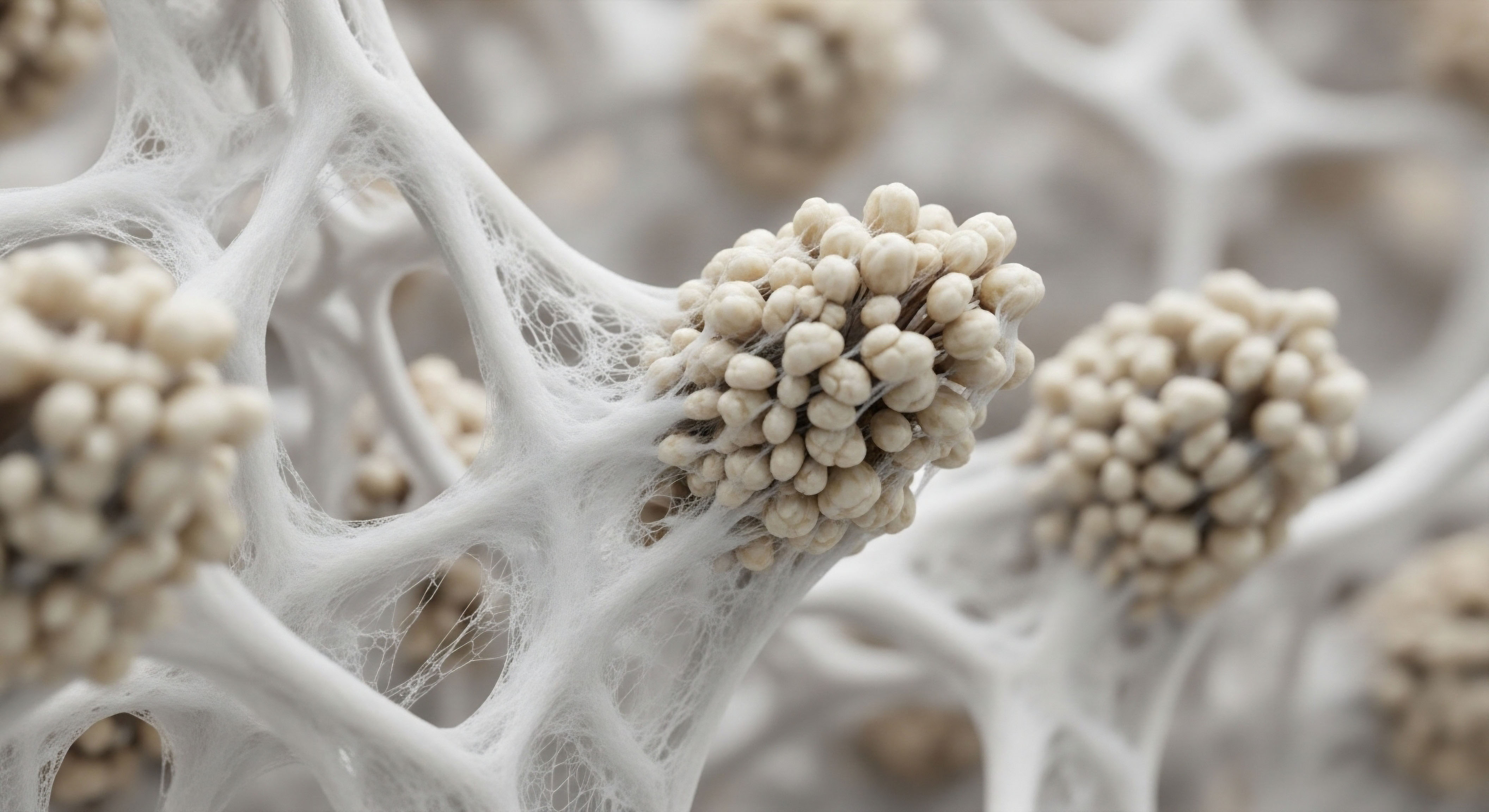

Fundamentals
Many individuals experience subtle yet persistent shifts in their well-being, often manifesting as changes in energy, mood, sleep quality, or body composition. These experiences, while deeply personal, frequently signal an underlying recalibration within the body’s intricate messaging network ∞ the endocrine system.
When considering hormonal optimization protocols, such as testosterone replacement therapy, understanding how daily practices influence their effectiveness becomes paramount. The body does not exist in isolation; its internal biochemistry is in constant dialogue with its external environment and the choices made within it.
Hormones, functioning as molecular couriers, transmit vital instructions throughout the body, orchestrating everything from metabolism to reproduction. Their influence extends to cellular growth, tissue repair, and even cognitive processes. The efficacy of exogenous hormone administration, therefore, hinges not solely on the administered dose but significantly on the receptivity of target cells and the systemic environment. This cellular receptivity, a key determinant of therapeutic success, undergoes constant modulation by various lifestyle elements.
Hormonal therapy efficacy is intrinsically linked to the body’s systemic environment and cellular receptivity, both profoundly shaped by lifestyle choices.

Hormones as Biological Messengers
Consider the endocrine system as a sophisticated communication network, where hormones serve as the crucial signals. These signals bind to specific receptors on or within cells, much like a key fitting into a lock, initiating a cascade of biochemical events. The quantity of these ‘locks’ (receptors) and their sensitivity to the ‘keys’ (hormones) are dynamic variables.
Lifestyle factors possess the capacity to either enhance or diminish this intricate cellular dialogue, directly influencing how effectively the body utilizes both its endogenous hormones and any administered therapeutic agents.
The Hypothalamic-Pituitary-Gonadal (HPG) axis, a central regulatory pathway, exemplifies this interconnectedness. This axis governs the production of sex hormones, including testosterone and estrogen. Disruptions to this delicate balance, often induced by chronic stress, inadequate nutrition, or insufficient physical activity, can impair the body’s natural hormonal rhythm. When exogenous hormones are introduced, their integration into this existing, lifestyle-modulated system dictates the ultimate physiological outcome.

What Is the Role of Physical Activity in Hormonal Signaling Pathways?
Regular physical activity acts as a profound modulator of endocrine function. Engaging in structured exercise influences hormone secretion, receptor sensitivity, and metabolic clearance rates. Resistance training, for instance, can upregulate androgen receptor density in muscle tissue, thereby enhancing the anabolic effects of testosterone. Conversely, excessive, unrecovered exercise can elevate cortisol levels, potentially creating an unfavorable hormonal milieu that dampens the therapeutic impact of administered hormones.
Cardiovascular exercise contributes to improved insulin sensitivity, a factor deeply intertwined with sex hormone binding globulin (SHBG) levels. Lower insulin resistance generally correlates with reduced SHBG, potentially leading to increased bioavailability of free, active hormones. This interplay underscores the necessity of integrating a balanced exercise regimen into any hormonal optimization protocol, ensuring that the body is primed for optimal therapeutic response.


Intermediate
For individuals undergoing hormonal optimization protocols, the strategic integration of lifestyle factors transcends general wellness advice; it becomes an indispensable component of the therapeutic strategy. The efficacy of treatments such as Testosterone Replacement Therapy (TRT) for men or women, or peptide therapies, hinges on the systemic environment created by daily habits. We move beyond simply administering a compound to cultivating a biological landscape where that compound can exert its most beneficial effects.
Consider the detailed protocols for male testosterone optimization, which often involve weekly intramuscular injections of Testosterone Cypionate. This therapy is frequently complemented by Gonadorelin to maintain testicular function and fertility, and Anastrozole to manage estrogen conversion. The effectiveness of these adjunctive medications, and indeed the primary testosterone, is profoundly influenced by the individual’s metabolic state, inflammatory burden, and stress response ∞ all direct consequences of lifestyle.
Lifestyle factors are not merely supplementary; they are foundational determinants of hormonal therapy success, influencing metabolic function and cellular response.

How Does Nutritional Biochemistry Alter Hormone Responsiveness?
Nutritional biochemistry profoundly shapes hormonal responsiveness. The macronutrient composition of the diet, alongside micronutrient adequacy, directly impacts the synthesis, metabolism, and action of hormones. For instance, diets rich in refined carbohydrates and saturated fats can induce insulin resistance, which in turn elevates SHBG and reduces free testosterone levels. This metabolic dysregulation can counteract the intended effects of exogenous testosterone, requiring higher doses or yielding suboptimal results.
Conversely, a diet emphasizing whole, unprocessed foods, lean proteins, healthy fats, and a diverse array of plant-based fibers supports optimal gut microbiome health. The gut microbiome plays a significant role in enterohepatic recirculation of hormones, particularly estrogens. A balanced microbiome aids in the proper excretion and metabolism of hormones, preventing their reabsorption and potential accumulation, which is particularly relevant when managing estrogen levels with Anastrozole in TRT protocols.

Dietary Impact on Specific Protocols
- Testosterone Replacement Therapy Men ∞ Adequate protein intake supports muscle protein synthesis, enhancing the anabolic effects of Testosterone Cypionate. Healthy fats, particularly monounsaturated and omega-3 fatty acids, contribute to cellular membrane integrity and receptor function.
- Testosterone Replacement Therapy Women ∞ Micronutrients like zinc and vitamin D are crucial for ovarian function and overall endocrine balance. A diet supporting stable blood glucose levels minimizes fluctuations that can exacerbate symptoms in peri-menopausal women.
- Growth Hormone Peptide Therapy ∞ Peptides such as Sermorelin or Ipamorelin, designed to stimulate growth hormone release, benefit from nutrient timing and protein intake to support the subsequent anabolic processes.

Can Sleep Architecture Influence Endocrine System Calibrations?
Sleep architecture, encompassing the various stages of sleep, serves as a fundamental regulator of endocrine system calibrations. Growth hormone secretion, for example, predominantly occurs during deep sleep stages. Disrupted sleep patterns, characterized by insufficient duration or poor quality, can significantly blunt this natural pulsatile release, diminishing the potential benefits of growth hormone-stimulating peptides.
The circadian rhythm, intricately linked to sleep-wake cycles, also dictates cortisol secretion. Chronic sleep deprivation elevates nocturnal cortisol levels, leading to a state of chronic physiological stress. This sustained cortisol elevation can antagonize the effects of sex hormones, potentially reducing the efficacy of TRT and contributing to symptoms such as fatigue and reduced libido, even when hormone levels appear numerically adequate.
| Lifestyle Factor | Mechanism of Influence | Relevance to Therapy Efficacy |
|---|---|---|
| Nutritional Intake | Modulates insulin sensitivity, gut microbiome, and substrate availability for hormone synthesis. | Affects hormone bioavailability, receptor sensitivity, and metabolism of therapeutic agents like Anastrozole. |
| Physical Activity | Influences hormone secretion, receptor density, and metabolic clearance. | Enhances anabolic effects of testosterone, improves insulin sensitivity, and supports cardiovascular health. |
| Sleep Quality | Regulates pulsatile hormone release (e.g. Growth Hormone), circadian cortisol rhythm. | Impacts therapeutic response to growth hormone peptides and overall HPG axis function. |
| Stress Management | Modulates HPA axis activity and systemic inflammation. | Prevents cortisol-induced antagonism of sex hormones, supporting the intended effects of TRT. |


Academic
The intricate dance between exogenous hormonal therapy and endogenous lifestyle modulators represents a fertile ground for advanced clinical understanding. Moving beyond simplistic dose-response relationships, a systems-biology perspective reveals how lifestyle factors epigenetically program cellular responses, enzymatically alter hormone kinetics, and modulate the neuroendocrine axes, thereby fundamentally dictating the ultimate efficacy of administered biochemical recalibrations. This academic exploration centers on the profound interconnectedness, demonstrating that the human organism actively participates in shaping its therapeutic outcomes.
Consider the profound influence of chronic psychological stress on the hypothalamic-pituitary-adrenal (HPA) axis. Sustained activation of this axis leads to persistent glucocorticoid elevation, notably cortisol. Cortisol, a pleiotropic hormone, can directly inhibit GnRH secretion from the hypothalamus and blunt pituitary LH and FSH release.
This peripheral antagonism, occurring even in the presence of exogenous testosterone, can attenuate the desired physiological effects, manifesting as persistent symptoms despite biochemically normalized serum androgen levels. The very milieu of the target tissue, steeped in a chronic stress response, reduces its capacity to respond optimally.
Lifestyle factors epigenetically program cellular responses and enzymatically alter hormone kinetics, profoundly influencing therapeutic outcomes.

Epigenetic Modulations and Receptor Dynamics
The efficacy of hormonal therapy extends beyond mere ligand-receptor binding; it encompasses the dynamic regulation of receptor expression and post-receptor signaling pathways. Lifestyle factors exert significant epigenetic influence, altering gene expression without changing the underlying DNA sequence.
For instance, regular physical activity and a diet rich in methyl donors can influence histone acetylation and DNA methylation patterns in androgen-responsive tissues. These epigenetic modifications can upregulate androgen receptor gene expression, increasing the density of functional receptors and thereby enhancing the cellular sensitivity to administered testosterone.
Conversely, diets high in pro-inflammatory components or chronic exposure to environmental toxins can induce adverse epigenetic changes. These changes may lead to downregulation of receptor expression or impairment of downstream signaling cascades, effectively creating a state of functional hormone resistance at the cellular level. Such a scenario necessitates a deeper clinical understanding, where optimizing the cellular environment through lifestyle interventions becomes as critical as the pharmacological intervention itself.

Metabolic Pathways and Enzyme Activity
The metabolic fate of administered hormones is heavily influenced by endogenous enzymatic activity, which is itself subject to lifestyle modulation. The enzyme aromatase, responsible for converting androgens into estrogens, provides a salient example. Adiposity, particularly visceral fat accumulation, significantly upregulates aromatase activity.
In men undergoing TRT, this heightened conversion can lead to elevated estradiol levels, necessitating the use of aromatase inhibitors like Anastrozole. However, lifestyle interventions targeting body composition through caloric management and resistance training can naturally mitigate excessive aromatase activity, potentially reducing the reliance on pharmacological inhibition.
Similarly, the activity of 5-alpha reductase, which converts testosterone into the more potent dihydrotestosterone (DHT), can be influenced by dietary patterns and inflammation. Specific dietary components, such as certain polyphenols found in green tea or saw palmetto, have demonstrated modulatory effects on this enzyme. Understanding these enzymatic pathways and their lifestyle determinants allows for a more refined, personalized approach to hormonal therapy, aiming for optimal metabolic clearance and desired hormonal ratios.
- Gut Microbiome and Enterohepatic Recirculation ∞ The gut microbiome plays a pivotal role in the enterohepatic recirculation of steroid hormones. Dysbiosis, an imbalance in gut microbiota, can alter the activity of bacterial beta-glucuronidase, an enzyme that deconjugates hormones in the gut, allowing for their reabsorption. A diet rich in fermentable fibers supports a healthy microbiome, facilitating proper hormone excretion and preventing undesirable reabsorption.
- Mitochondrial Function and Cellular Energy ∞ Mitochondrial health, driven by nutrient availability and exercise, underpins cellular energy production. Optimal mitochondrial function is essential for the energy-intensive processes of hormone synthesis, receptor signaling, and cellular repair. Lifestyle practices that enhance mitochondrial biogenesis and efficiency, such as high-intensity interval training and targeted nutritional support, therefore amplify the cellular capacity to respond to and utilize hormonal therapies.
- Neurotransmitter Balance and Endocrine Feedback ∞ The intricate balance of neurotransmitters, influenced by sleep, stress, and nutrition, directly impacts the neuroendocrine feedback loops. For instance, adequate serotonin and dopamine levels, supported by precursor amino acids and healthy gut function, contribute to stable mood and improved sleep, which in turn positively influence the HPG and HPA axes. This creates a more receptive internal environment for hormonal interventions.
| Mechanism | Lifestyle Influence | Therapeutic Impact |
|---|---|---|
| Androgen Receptor Upregulation | Resistance training, specific micronutrients (e.g. Zinc), epigenetic modifiers. | Increased cellular sensitivity to testosterone, enhancing anabolic effects. |
| Aromatase Activity Modulation | Body composition management, dietary polyphenols. | Optimized testosterone-to-estrogen ratio, reducing need for pharmacological inhibitors. |
| 5-alpha Reductase Regulation | Dietary components (e.g. certain plant extracts), inflammation management. | Fine-tuned conversion of testosterone to DHT, supporting desired androgenic effects. |
| Gut Microbiome Diversity | Fiber-rich diet, probiotic intake. | Optimized hormone excretion and reduced enterohepatic recirculation, supporting metabolic balance. |
| Mitochondrial Biogenesis | Targeted exercise, caloric restriction, specific nutrients (e.g. CoQ10). | Enhanced cellular energy for hormone signaling and utilization. |

References
- Vingren, J. L. et al. “Testosterone Physiology in Resistance Exercise and Training ∞ The Up-Regulation of the Androgen Receptor.” Sports Medicine, vol. 40, no. 12, 2010, pp. 1037-1053.
- Liu, P. Y. et al. “The Impact of Lifestyle Factors on Testosterone Levels and Male Reproductive Health.” Asian Journal of Andrology, vol. 18, no. 6, 2016, pp. 803-810.
- Donga, E. et al. “A Single Night of Partial Sleep Deprivation Induces Insulin Resistance in Healthy Promenopausal Women.” Journal of Clinical Endocrinology & Metabolism, vol. 96, no. 10, 2011, pp. E1417-E1423.
- Hopps, E. et al. “Adipose Tissue as an Endocrine Organ ∞ A Review of Hormonal Functions and Metabolic Interactions.” Obesity Reviews, vol. 11, no. 3, 2010, pp. 227-238.
- Baker, L. B. “The Effects of Exercise on the Endocrine System.” ACSM’s Health & Fitness Journal, vol. 20, no. 5, 2016, pp. 10-18.
- O’Keefe, J. H. et al. “The Impact of Diet on Hormone Levels ∞ A Review of the Evidence.” Journal of the American College of Cardiology, vol. 68, no. 23, 2016, pp. 2631-2646.
- Nehlig, A. “The Neurochemical Basis of Sleep Regulation.” Brain Research Reviews, vol. 53, no. 1, 2006, pp. 1-25.
- Cryan, J. F. et al. “The Microbiome-Gut-Brain Axis.” Physiological Reviews, vol. 99, no. 4, 2019, pp. 1877-2013.

Reflection
The journey toward optimal hormonal health is deeply personal, mirroring the unique biochemical landscape within each individual. Understanding the profound influence of lifestyle factors on hormonal therapy efficacy marks a significant step. This knowledge serves as a compass, guiding you toward a more informed and empowered approach to your well-being.
Consider this information a foundational element in constructing your personalized wellness blueprint, recognizing that your daily choices are potent modulators of your internal systems. Reclaiming vitality and function without compromise necessitates a proactive engagement with your biological reality, a continuous process of learning and adaptive action.



